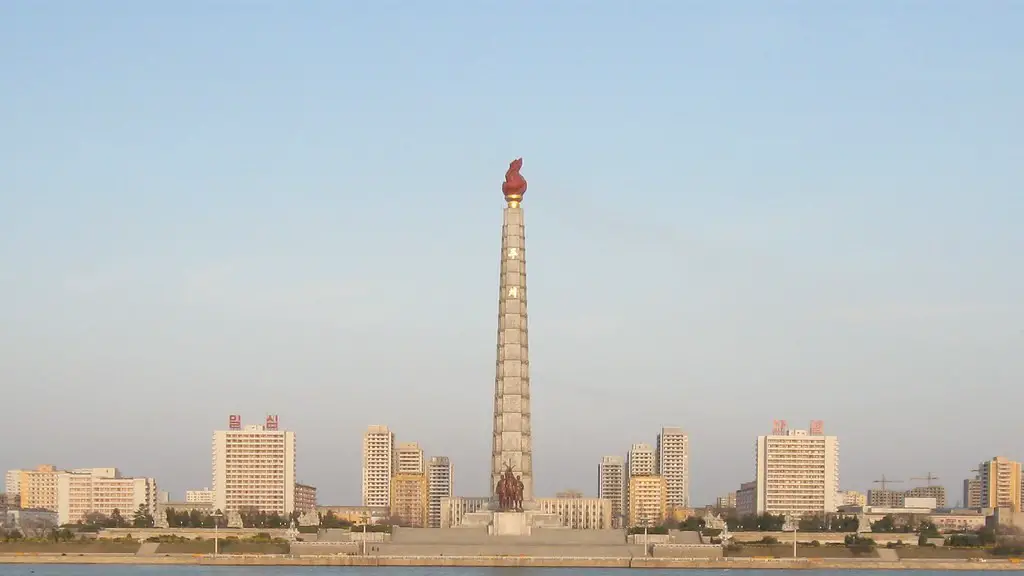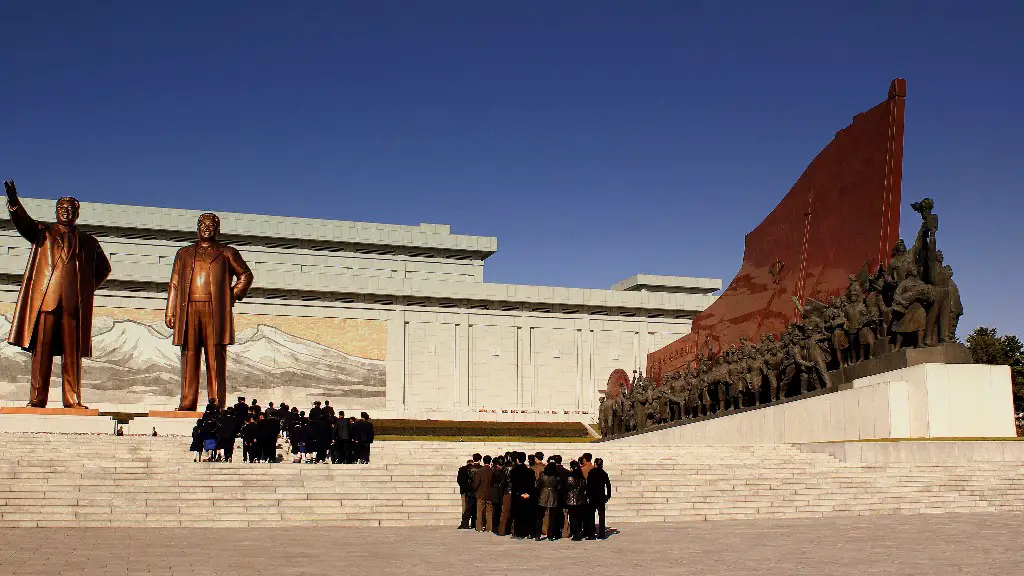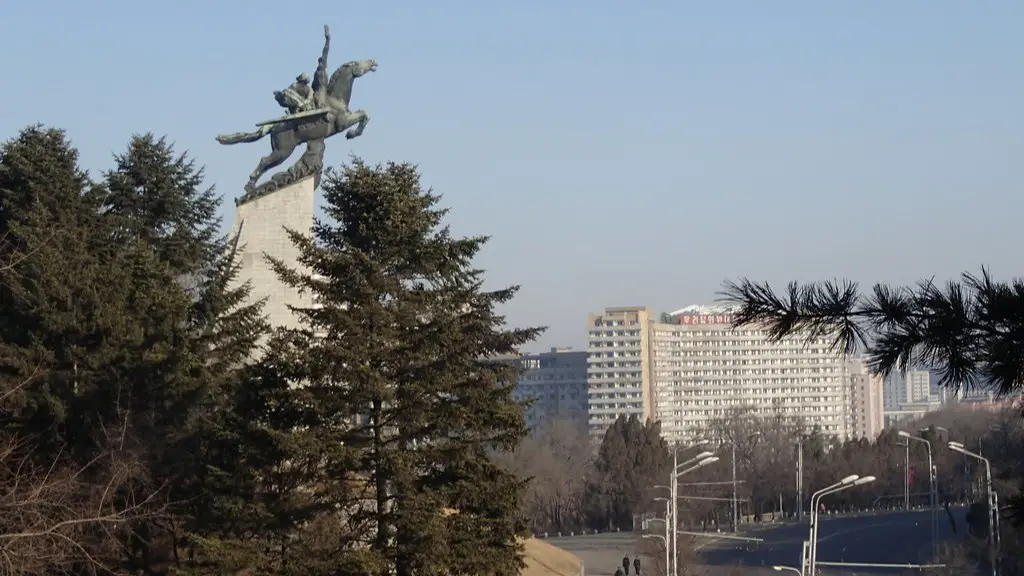The relentless development of North Korean nuclear weapons has tempted some countries, particularly the United States, to consider military intervention. With the country set to become a full-fledged nuclear power within the next few years, can the US stop a nuclear attack from North Korea?
Before responding to this question, it is important to gain an understanding of the current state of North Korea’s nuclear arsenal. According to experts, North Korea has at least 10 nuclear weapons. The country has also conducted several missile launches over the last decades, some of which were tests of intercontinental ballistic missiles (ICBMs). North Korea’s nuclear weapons and missiles are believed to be designed to reach US mainland.
If North Korea were to launch an attack against the US, the US would likely use maximum firepower against the country. For example, the US has an extensive stockpile of non-nuclear air-launched cruise missiles that could be employed. These would threaten civilian populations and disrupt power and other financial and communication infrastructure.
It is largely agreed among experts that any US military intervention in North Korea would be difficult and unpredictable. It is also likely that North Korea would retaliate with a full-scale attack, which could have catastrophic consequences for both North and South Korea, as well as the US. For this reason, US military intervention has been widely opposed by international organizations, such as the United Nations Security Council.
Alternatively, the US could use economic sanctions against North Korea. The US has used economic sanctions in the past, such as the “Six-Party Talks” of 2004-2007, to persuade North Korea to halt its nuclear weapons program. However, while economic sanctions can be effective in deterring some countries, they are largely ineffective against North Korea.
The US could also take a diplomatic approach. The US could negotiate with other countries, particularly China and Russia, to persuade North Korea to abandon its nuclear weapons program or make it less threatening. The US could also work with its allies in the region, such as South Korea and Japan, to build a buffer zone to make it more difficult for North Korea to launch a nuclear attack. However, this involves a lot of negotiation and compromises and could be difficult to achieve.
International Pressure
Using international pressure is another option. The US could work with its allies to impose international sanctions, such as trade embargoes, on North Korea if it does not comply with international law. The US could also call for UN resolutions to condemn North Korean aggression and pressure North Korea to disarm.
While international pressure can be effective, it may not be enough to deter North Korea from launching a nuclear attack. North Korea has shown time and time again that it is willing to ignore international opinion and pressure, and has even gone as far as developing ICBMs.
The US could also use a carrot-and-stick approach to influence North Korean behaviour. The US could offer incentives and rewards, such as economic aid and the lifting of economic sanctions, if North Korea agrees to give up its nuclear weapons program. However, this approach has been tried and failed in the past and is unlikely to be effective.
In short, it is difficult to say whether the US can stop a nuclear attack from North Korea. North Korea is a formidable opponent, and any US intervention could have drastic and unintended consequences. The US should consider all options carefully before taking any action.
Peaceful Negotiations
One possible solution to the North Korean nuclear crisis is through peaceful negotiations. Diplomatic talks, such as the Six-Party Talks of 2004-2007, could be used to convince North Korea to abandon its nuclear weapons program. However, this approach has been tried and failed in the past, and North Korea has refused to engage in any meaningful negotiations.
The US could also work with its allies in the region to create a buffer zone to deter North Korean aggression. This could involve military exercises, joint military drills, and other measures to demonstrate international resolve and to reduce the threat posed by North Korea.
However, this approach could lead to further escalation between the US and North Korea. There is a risk that North Korea could respond to such measures with increased aggression, leading to further conflict. For this reason, any US strategy should be carefully thought out before being implemented.
The US could also work with China and Russia to convince North Korea to give up its nuclear weapons program. Both countries have significant leverage over North Korea, and enlisting their help could be the key to ending the crisis. However, this would require a lot of diplomatic efforts and negotiations, and there is no guarantee that North Korea would comply.
Soft Power
In addition to hard power, the US could also use soft power, such as public opinion, media, and economic aid, to pressure North Korea to abandon its nuclear weapons program. The US could use public opinion to demonstrate to North Korea that its nuclear weapons program is not popular. The US could also use economic aid to reward North Korea for agreeing to give up its nuclear weapons program.
The US could also work with international organisations, such as the United Nations, to promote dialogue and diplomacy between the US and North Korea. This could involve diplomatic visits, joint military exercises, and other measures to increase dialogue between the two countries. This could be a more successful strategy than relying solely on economic sanctions or military intervention.
Another option is for the US to take a humanitarian approach. This could involve providing food and medical aid to North Korea, as well as working with international organisations to improve human rights in North Korea. This could help to improve relations between the US and North Korea. However, this approach would require considerable diplomatic efforts on the part of the US, and there is no guarantee that North Korea would respond positively.
Future Impact
It is clear that the US cannot stop a nuclear attack from North Korea on its own. Any US intervention in North Korea is likely to have drastic and unintended consequences. For this reason, the US should consider all possible options carefully before taking any action.
The most effective way for the US to stop North Korea from launching a nuclear attack may be through negotiations and diplomacy. This could involve working with other countries, such as China and Russia, to persuade North Korea to abandon its nuclear weapons program. However, this would require a lot of hard work and negotiation, and there is no guarantee that North Korea would comply.
The US could also use a combination of soft power, such as public opinion, the media, and economic aid, as well as hard power, such as military intervention, to persuade North Korea to abandon its nuclear weapons program. However, any US intervention in North Korea must be carefully thought out and executed in order to avoid further escalation and conflict.
In short, the US cannot stop a nuclear attack from North Korea on its own. The US must work with its allies and other countries to create a diplomatic solution that is acceptable to both sides. The US should also consider the long-term impacts of any action it takes, as any action could have far-reaching implications for the future.
Impact on Relationships
The escalating tensions between the US and North Korea have had a serious impact on relationships between the two countries. Tensions have been further exacerbated by North Korea’s continued development of its nuclear weapons program and its repeated missile tests. The US has responded with sanctions and other measures to pressure North Korea to abandon its nuclear weapons program.
It is likely that the US-North Korea relationship will further deteriorate if the crisis persists. This could have major implications for the region, as a war between the two countries could lead to massive casualties and destabilize the region. It could also lead to a nuclear arms race in the region, as other countries could feel compelled to develop nuclear weapons to counter North Korea.
The US must work with its allies and other countries to resolve the crisis peacefully. This could involve direct negotiations between the US and North Korea or working with other countries, such as China and Russia, to persuade North Korea to abandon its nuclear weapons program.
It is clear that the US cannot stop a nuclear attack from North Korea on its own. The US should work with its allies and other countries to find a diplomatic solution that is acceptable to both sides. This is the only way to ensure that the crisis is resolved peacefully and that the region does not descend into war.





